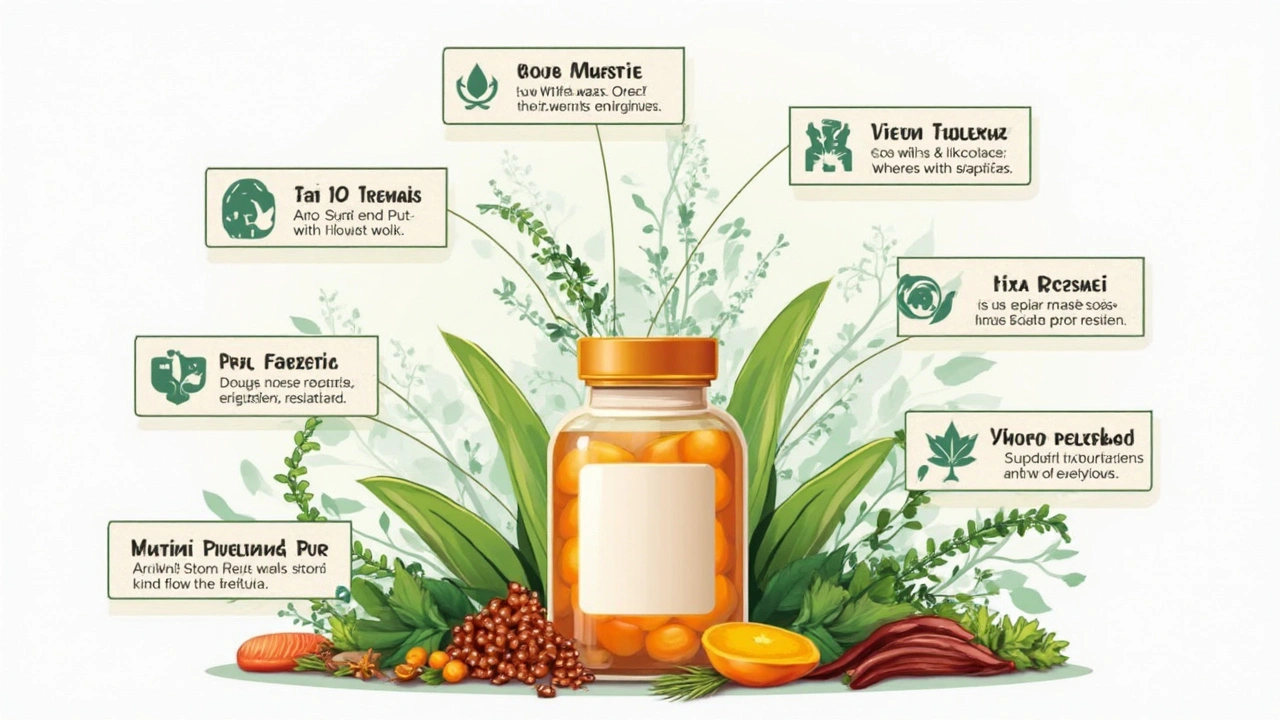When you hear someone talking about immune-boosting herbs, you don't usually expect an over-the-counter mix to have a fan following across several continents. Then again, Septilin isn't just any blend—it's one of those herbal remedies that's been hanging out on the pharmacy shelves and in home medicine cabinets for decades. Made famous by Himalaya, a giant in herbal health products, Septilin is not exactly a miracle cure, but you have to admit it manages to stir curiosity and debate wherever it pops up. Could something as simple as a tablet, syrup, or even a powder drink made from herbs like Guduchi, Manjistha, and Licorice really support your body’s immune system? Or is it all just clever marketing wrapped in an exotic label?
What is Septilin and What’s in It?
Check out the box of Septilin and you’ll see a laundry list of plants: Guduchi (Tinospora cordifolia), Manjistha (Rubia cordifolia), Licorice (Glycyrrhiza glabra), and a few other Ayurvedic classics. Himalaya’s formula is pretty simple: bring together herbs long used for immune support, blend them into an easy-to-take form, and see if modern science backs them up. That’s the selling point. The real question is, what’s actually in each serving? Septilin usually comes as tablets or syrup. Each tablet or spoonful of syrup gives you powdered extracts of these power-herbs, combined in a proprietary mix (which means, by the way, that the exact amounts aren’t plastered all over the packaging).
Guduchi is often called the ‘heavenly elixir’ in Indian households. Traditionally, it’s been used not only for the sniffles but for all sorts of issues—everything from fevers to feeling run-down. Modern studies say Guduchi packs polysaccharides and antioxidants. Manjistha, with its deep red roots, is pretty famous for its supposed detox powers; Ayurvedic texts talk it up for skin and blood health. Licorice gets thrown into the mix for its soothing properties. If you’ve ever had a sore throat, chances are you tried a licorice lozenge or two. Then there’s Indian Bdellium (Guggulu), a sticky resin that might help with inflammation. Septilin also has Masha (Black Gram) and a dash of Shankh Bhasma (calcined conch shell), which is ancient-sounding but really just powdered mineral rich in calcium. There are actual research papers out there, like one in the “Ancient Science of Life” journal, discussing how these herbs might reduce oxidative stress and help white blood cells do their thing, though results are sometimes more hopeful than conclusive.
Here’s something most people miss—Septilin doesn’t contain any synthetic chemicals meant to fight infections directly. Instead, it’s all about nudging your immune system to work a little smarter or harder. That’s important. If you’re looking for an instant fix like antibiotics, this is not the pill for you. Septilin is more in the camp of ‘supportive’ than ‘curative’ if you get what I’m saying.
If you pop into an Indian pharmacy, you’ll see Septilin right next to cough and cold remedies. Don’t expect a buzzing, day-glow pill. These are somewhat old-school looking. The syrup is, well, a bit sticky and sweet, packed with herbal notes that may take some getting used to. Some folks claim it’s a lifesaver during seasonal changes; others think it’s overhyped herbal tea. But if you dig through the research, there are a few interesting nuggets. For example, one 2022 clinical study in India looked at children with frequent upper respiratory infections who took Septilin every day for four months. They reported milder symptoms and fewer sick days. Nothing wild or overnight, but not nothing, either.
This does not mean the capsules will make you invincible—if only. There’s also a lot of hype online that’s, let’s say, less than scientific. Septilin is not a substitute for vaccines, antibiotics, or medical care. But as a daily immune health supplement? That’s where the conversation gets interesting.

Potential Benefits and How People Use Septilin
Let’s get down to why people reach for a bottle of Septilin. Most take it during ‘change of season’ periods, which is internist-speak for those times when everyone is sniffling, sneezing, and passing around coughs like party favors. It’s especially popular with parents of school-age kids, people who travel a lot, or anyone who feels like their immune system is dragging. According to Himalaya and a few clinical studies, Septilin may help with recurrent respiratory infections—think the usual coughs and colds, sinus infections, or even tonsillitis. Some doctors in India recommend it as a supportive therapy for bronchitis, especially for people who seem to catch every bug flying around the office air.
How does it work? The theory is pretty straightforward: herbs like Guduchi and Manjistha may help ramp up your white blood cells, the sentinels that spot and attack viruses and bacteria. Several laboratory studies show extracts from these plants can boost levels of phagocytes (those big-eating immune cells), help antibody formation, and reduce inflammation. Not all studies are perfect—some are small, others sponsored by herbal companies—but there’s enough buzz to merit attention. Dr. Shailaja Nambiar, an Ayurveda consultant, once told “The Hindu,”
"Ayurvedic polyherbal formulas like Septilin are not a replacement for antibiotics or modern medicines, but they can reduce the frequency of infections in susceptible individuals."
Aside from sniffly noses and scratchy throats, Septilin sometimes appears on prescription notes for people recovering from surgery or dental procedures. Why? According to users, it helps the healing process by keeping infections at bay. A bonus—there’s anecdotal chatter about it helping skin conditions and reducing post-surgical swelling. Some folks report better energy, fewer days out sick, and quicker recovery from minor viral infections like the flu. If you dig into parent forums, you’ll find endless recommendations for giving Septilin to kids who keep missing school due to constant colds. It’s not exactly a magic shield, but when combined with good sleep, nutrition, and basic hygiene, it just might tip the scales in your favor.
Of course, there’s no such thing as a free ride. Even herbal products have their guidelines. Most adults will take 2 tablets twice daily, or 5-10ml of syrup twice a day, usually after eating. But these amounts aren’t set in stone—different doctors might suggest different doses, especially for children or seniors. As always, if you’re pregnant, nursing, or have a chronic illness, talk to a healthcare pro first. Some herbs in Septilin might not play nice with certain medicines (think blood pressure pills or immunosuppressants). And if you have allergies to any listed ingredients—time to pick another supplement.
Ever wondered if you could just eat the herbs instead? Sure, but most people find it easier to swallow a couple of pills than to brew a strong decoction every morning. Convenience is kind of the whole point. But if you want to go the slow-and-steady route, fresh Guduchi or licorice tea is a legit option (just ask your grandmother).
One pro tip—if you’re using Septilin to bounce back after an illness, stay consistent. Missing a dose here and there won’t hurt, but it also won’t give you a fair shot at seeing if it actually does anything. Most regular users say it takes about two to four weeks to notice real changes, especially if their immune system has been out of whack. If you’re planning ahead for winter, starting in the fall gives you a bit of a head start.

Side Effects, Risks, and Smart Tips for Using Septilin
Even the most natural-seeming products can trip you up if you take them the wrong way, or expect too much. Septilin is generally seen as safe for short-term use in adults and kids, but—big surprise here—it’s not entirely risk-free. Most people get through a course with no issues, but a handful report mild stomach trouble: heartburn, gas, or a bit of nausea. It’s rare, but allergic reactions are possible (especially if you’re sensitive to herbs like licorice, which can sometimes trigger headaches or high blood pressure when overused). If you feel itchy, start to swell, or get rashes, stop immediately and see a doctor. It’s not about being scared, it’s just being smart with your health.
If you’re on medication for heart, kidney, or liver disease, check in with your doctor first. Herbs can mess with how some drugs are absorbed, sometimes making them less effective or even causing side effects to stack up without warning. For example, licorice might not agree with people with high blood pressure or those taking diuretics, as it can affect potassium levels. If you’re thinking of taking Septilin alongside other supplements, ease in slowly and monitor how you feel.
Another thing to consider—Septilin isn’t habit-forming and doesn’t cause tolerance, so you won’t have to take more and more to get the same effect. But don’t fall into the trap of thinking more is better. Doubling your dose won’t make your immune system twice as strong. It’ll just up your chances of digestive upset. Always follow the suggestion on the label or your healthcare provider’s advice.
Adverse events are rare but possible when products aren’t from trusted companies. Always buy from reputable sources (Himalaya is the most recognized, but only use official vendors). Even the best herbal brands have been caught up in contamination scandals, so check for the lot number, seal, and a real expiration date. If the batch smells weird or looks off, don’t risk it.
What about long-term use? Septilin has been around a while, but there aren’t decades-worth of longitudinal safety studies, especially for children and pregnant women. A safe play is to take it for a couple months at a time, then take a break and reassess. If your symptoms aren’t budging, it might be time to talk to a specialist, not just add another tablet to your daily lineup.
Navigating the world of herbal supplements can be like hiking a trail at dusk—there’s beauty, but you still want a flashlight. Listen to your body, read every label, never treat any supplement as a one-stop solution, and keep your regular healthcare appointments. For those who find themselves stuck between constant annoyances like the common cold and the worry that modern meds are just too much, Septilin offers a middle path: not a silver bullet, but maybe a little shield when you need it.
If you ask people who swear by Septilin, they’ll tell you the tiny tablets or spoonfuls of sweet, herby syrup are just part of the wellness puzzle. If you choose to join the club, remember: a good night’s sleep, balanced meals, washing your hands, and a strong social support network are every bit as important as any bottle you keep on your counter. Stay savvy, stay skeptical, and use every tool wisely.
